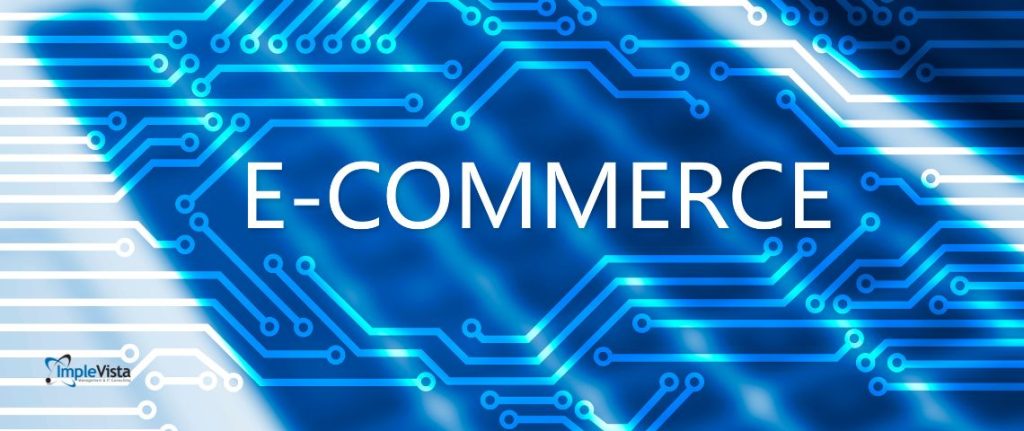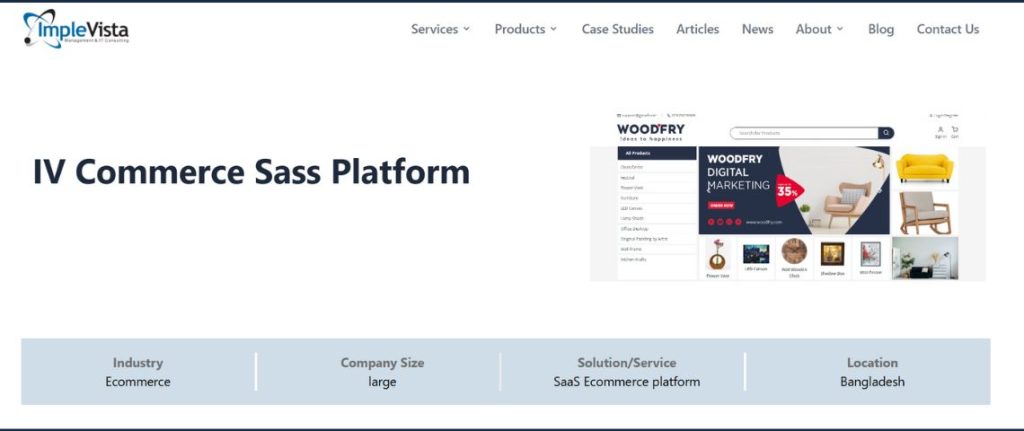Ecommerce mobile applications are reshaping how consumers shop, offering speed, convenience, and personalized experiences that fuel business growth.
In today’s hyper-connected world, the smartphone is more than just a communication device; it’s a personal shopping assistant, a digital wallet, and a direct portal to countless businesses. For modern e-commerce enterprises, simply having a website is no longer enough to capture the full attention of today’s digital consumers. The question isn’t whether you need a mobile presence but how deeply integrated that presence should be. The answer increasingly points to a robust e-commerce mobile application.
At Implevista, a leading IT service company in Dhaka, Bangladesh, we specialize in providing cutting-edge IT solutions and services that drive business growth. We’ve witnessed firsthand how businesses that embrace a comprehensive mobile strategy, particularly through dedicated apps, gain a significant competitive edge.
E-commerce mobile application development is not just an option but a fundamental pillar for success in modern retail. This article will delve into the critical role of mobile apps in contemporary e-commerce businesses, explaining what mobile e-commerce is and why a dedicated app is essential for sustainable growth.
What is Mobile E Commerce (M-commerce), and Why Does It Dominate?
Before we dive into the specifics of apps, let’s clarify what mobile e-commerce (m-commerce) is. Mobile e-commerce (m-commerce) refers to buying and selling goods and services using wireless handheld devices such as smartphones and tablets. It encompasses everything from Browsing products and making purchases to mobile banking and digital payments.
Why has m-commerce become so dominant?
- Smartphone ubiquity: Most consumers globally, including Bangladesh, carry a smartphone. This makes mobile shopping accessible anytime, anywhere.
- Convenience: Shopping on the go, during commutes, or from the comfort of one’s home has become the norm.
- Personalization: Mobile devices allow for highly personalized experiences based on location, past purchases, and Browsing behavior.
- Speed: Apps load faster and provide a more streamlined checkout process than mobile websites.
Given this landscape, an e-commerce mobile application is no longer a luxury but a necessity for businesses that want to thrive.

The Powerhouse: How an Ecommerce Mobile Application Transforms Your Business
A dedicated e-commerce mobile application offers advantages that traditional websites, even mobile-responsive ones, cannot match. It’s about building a deeper connection with your customers.
-
Enhanced User Experience (UX) and Performance
A well-designed e-commerce mobile application offers a superior user experience to a mobile website.
- Speed and Responsiveness: Native apps are typically faster and more responsive, leading to smoother navigation and loading times. This is crucial for retaining impatient mobile users.
- Intuitive Interface: Apps can leverage device-specific features like gestures, touch ID, or facial recognition for quicker logins and checkouts. They offer a highly optimized, native look and feel that users are accustomed to.
- Offline Capabilities: Some e-commerce mobile application designs can offer limited offline browsing of product catalogs or wishlists, enhancing accessibility even in areas with spotty internet connectivity.
- Personalization and Customization: Apps remember user preferences, search history, and shopping habits, enabling a highly personalized shopping journey, from tailored product recommendations to customized interfaces.
-
Boosting Customer Engagement and Loyalty
An e-commerce mobile application is powerful for fostering customer loyalty and keeping your brand top-of-mind.
- Push Notifications: This is a game-changer. Apps allow businesses to send targeted push notifications directly to a user’s device, informing them about new arrivals, flash sales, abandoned cart reminders, personalized offers, or shipping updates. This creates direct communication that website visitors often miss.
- Personalized Offers and Promotions: Based on user data, purchase history, and location, apps can deliver highly relevant discounts and promotions, increasing conversion rates.
- Loyalty Program Integration: Apps are ideal platforms for integrating loyalty programs. They allow customers to track points, redeem rewards, and receive exclusive member benefits directly on their phones.
- Gamification: Integrating fun, interactive elements (like spin-to-win games for discounts) can significantly boost engagement and encourage repeat purchases.
Implevista’s Value: We design ecommerce mobile application solutions that are not just transactional tools but vibrant hubs for customer interaction, driving repeat business and building strong brand affinity.
-
Streamlined Checkout Process and Increased Conversions
Mobile apps often increase conversion rates due to a more streamlined and secure checkout.
- Simplified Payments: Apps can integrate with popular mobile payment methods (e.g., Apple Pay, Google Pay, and local Bangladeshi options like bKash Nagad), allowing one-tap payments without re-entering card details.
- Saved User Information: Apps can securely store customer details, shipping addresses, and payment preferences, significantly speeding up the checkout process and reducing cart abandonment.
- Less Distraction: A dedicated app environment means fewer distractions than a browser, leading to a more focused shopping experience and higher completion rates.
- Quick Re-orders: For repeat purchases, apps can offer a seamless re-order function, making it incredibly convenient for customers.
Implevista’s Expertise: Our focus as an ecommerce mobile app development company is on creating frictionless checkout flows that minimize friction and maximize conversions for your ecommerce mobile application.
-
Access to Device Features and Advanced Functionality
An ecommerce mobile application can leverage native smartphone features to offer unique and powerful functionalities that elevate the shopping experience.
- Camera Integration: For augmented reality (AR) features (e.g., “try before you buy” for furniture or clothes), barcode scanning for product lookups, or even visual search.
- GPS and Location Services: Offering location-based promotions, store locators, or personalized delivery options.
- Push Notifications (revisited): As mentioned, it is a critical native feature for direct communication.
- Biometric Authentication: Secure and quick login using fingerprint or facial recognition.
- Offline Access: Allowing users to browse catalogs or manage wishlists without an active internet connection.
-
Deeper Analytics and Insights
An ecommerce mobile application provides richer data for understanding customer behavior than a website alone.
- Granular User Behavior Tracking: Track app usage patterns, popular features, navigation flows, and precise friction points within the app.
- Push Notification Performance: Measure open rates, click-through rates, and conversions directly attributable to push campaigns.
- Offline Data Collection: Collect data even when the user is offline, syncing it when a connection is restored.
- Device-Specific Insights: Understand how different devices or operating systems influence user engagement.
This detailed analytical capability allows businesses to refine their strategies, optimize their ecommerce mobile application, and personalize marketing efforts more effectively.
-
Building Brand Presence and Credibility
A dedicated app signals professionalism and commitment to the customer experience in a crowded market.
- Brand Visibility: An app icon prominently displayed on a user’s home screen offers constant brand visibility, even when not in active use.
- Professional Image: A polished e-commerce mobile application enhances your brand’s credibility and positions you as a modern, forward-thinking business.
- Direct Channel: The app provides a direct communication channel, fostering community and exclusivity.
- Competitive Edge: Especially in emerging markets like Bangladesh, a high-quality ecommerce mobile application can differentiate you from competitors who rely solely on mobile websites.

When to Invest in an Ecommerce Mobile Application: Is It Right for You?
While the benefits are clear, investing in an ecommerce mobile application is a significant decision. Consider these factors:
- Customer Behavior: Do your customers frequently access your site via mobile? Do they prefer apps over mobile websites for other services?
- Repeat Purchases/Loyalty: An app can be incredibly effective if your business thrives on repeat customers or loyalty programs.
- Unique Features: Do you want to implement features that are best (or only) supported by native app capabilities (e.g., AR, advanced offline mode, deep device integration)?
- Competitive Landscape: Are your main competitors leveraging ecommerce mobile applications effectively?
- Long-Term Vision: Is a strong, persistent customer relationship a core business strategy?
Challenges and Considerations in Ecommerce Mobile App Development
Developing a successful ecommerce mobile application isn’t without its hurdles. Businesses need to be aware of:
- Development Cost: Native app development for iOS and Android can be more expensive than building a responsive website.
- Maintenance and Updates: Apps require ongoing maintenance, bug fixes, and regular updates to ensure compatibility with new OS versions and device models.
- App Store Optimization (ASO): Discovering your app on app stores (Apple App Store, Google Play Store) requires strategic ASO efforts.
- Marketing and Adoption: Encouraging users to download and consistently use your app requires a dedicated marketing strategy.
- Security: Ensuring robust data security and privacy within the app is paramount for user trust.
- Feature Creep: Balancing desired features with app performance and user simplicity is key.
Implevista’s Solution: As an experienced e-commerce mobile app development company, we work closely with clients to navigate these challenges, providing cost-effective and scalable solutions tailored to their business needs and budget. We ensure that your e-commerce mobile application is a success.

Mobile App vs Mobile Website: Which Is Better for E-Commerce?
When establishing a strong mobile presence, e-commerce businesses often face a crucial decision: Should you invest in a mobile app or optimize your mobile website? Both options have distinct advantages, depending on your business goals, budget, and user expectations.
| Feature | Mobile App | Mobile Website |
| Speed & Performance | Significantly faster due to local storage and preloaded content | Generally slower as it relies on browser caching and internet connectivity |
| Offline Access | Yes – can offer offline functionality for browsing and saving items | No – requires a stable internet connection to load pages |
| User Experience | Highly interactive, seamless, and tailored to user behavior | Consistent experience across devices, but limited interactivity |
| Personalization | Advanced – uses user data for tailored product suggestions and preferences | Limited personalization, mostly based on cookies and browsing behavior |
| Push Notifications | Yes – allows direct and real-time communication with users | No – relies on email or browser alerts, which are less immediate |
| Installation | Requires download and storage space on the user’s device | Instantly accessible through browsers, no installation required |
| Development Cost | Higher – requires platform-specific development (iOS/Android) | Lower – single responsive website works across all devices |
| Updates & Maintenance | Updates need to be pushed through app stores and approved | Easy to update and deploy changes via CMS or backend |
| Conversion & Retention | Higher retention through loyalty features, saved preferences, and gamification | Generally, lower retention, users may bounce more easily |
What’s the Verdict?
Mobile websites are essential for discoverability and quick Access, especially for new users. However, suppose your e-commerce business aims to build a long-term customer relationship, boost engagement, and deliver a highly branded experience. In that case, a mobile app is the better investment. Apps empower you with tools like push notifications, in-app loyalty programs, and tailored interfaces that convert casual browsers into repeat buyers.
Combining a mobile-friendly website and a dedicated app can offer the best of both worlds for growing brands with high user interaction.

How Implevista Builds Future-Ready Mobile E-Commerce Solutions
As a trusted ecommerce mobile app development company in Bangladesh, Implevista takes a strategic, end-to-end approach to crafting robust mobile commerce experiences. Our process starts with in-depth strategy and consultation, ensuring every feature aligns with your unique business goals and target audience.
We then move to UI/UX design, prioritizing intuitive navigation and brand-consistent aesthetics to deliver a seamless customer journey. In the development phase, our expert engineers build high-performance iOS and Android apps using cutting-edge frameworks like Flutter, React Native, and Swift, ensuring fast loading speeds and scalability.
Every app undergoes rigorous testing and deployment to eliminate bugs and ensure smooth Performance across devices. Post-launch, we provide ongoing support and optimization, including user analytics, performance monitoring, and regular feature updates, ensuring your app evolves with market trends.
Choosing a professional e-commerce mobile app development company like Implevista means your app is not just functional—it’s future-ready, secure, and designed to deliver measurable ROI.
FAQs: Your Questions About Mobile Apps in E-Commerce Answered
- What exactly is an ecommerce mobile application?
An e-commerce mobile application is a dedicated software program designed to run on smartphones and tablets. It allows users to browse products, make purchases, manage orders, and interact with an online store directly from their mobile device.
- What is mobile e-commerce (m-commerce)?
Mobile e-commerce (m-commerce) refers to commercial transactions conducted using mobile devices, such as buying products through a mobile app or a mobile-optimized website. It’s the subset of e-commerce that takes place on mobile.
- Why is an ecommerce mobile application better than just a mobile-responsive website?
An ecommerce mobile application typically offers faster Performance, a more intuitive user interface, offline capabilities (sometimes), Access to device features (camera, GPS, biometrics), and the ability to send push notifications, leading to a superior user experience and higher engagement than a mobile-responsive website.
- What are the main benefits of having an ecommerce mobile application for my business?
Key benefits include increased customer engagement and loyalty (via push notifications and loyalty programs), a more streamlined checkout process, Access to device-specific features for unique experiences (like AR), richer data analytics, and enhanced brand presence.
- How do push notifications from an ecommerce mobile application help businesses?
Push notifications are direct messages from your ecommerce mobile application to a user’s device. They are highly effective for re-engaging users with personalized offers, abandoned cart reminders, new product alerts, and order updates, driving immediate action and sales.
- Is developing an ecommerce mobile application expensive?
The cost of ecommerce mobile application development varies significantly based on features, complexity, platform (iOS, Android, or both), and development team. While it can be a significant investment, the potential for increased conversions, loyalty, and engagement often provides a strong ROI.
- How does an ecommerce mobile application improve the customer’s shopping experience?
It improves it by offering faster loading times, an intuitive interface, quick login via biometrics, securely saved payment details, personalized recommendations, and a distraction-free shopping environment, leading to a more seamless and enjoyable journey.
- What role does personalization play in an ecommerce mobile application?
Personalization is central. An e-commerce mobile application can leverage user data, Browsing history, and purchase patterns to offer highly relevant product recommendations, customized promotions, and tailored content, making each user’s shopping experience unique.
- Why should I choose an ecommerce mobile app development company like Implevista in Dhaka, Bangladesh?
Implevista, a leading ecommerce mobile app development company in Dhaka, combines local market understanding with global best practices. We offer end-to-end solutions, focusing on user experience, robust security, and strategic features that drive growth and deliver a strong ROI for your ecommerce mobile application.
- What are the main challenges in launching and maintaining an ecommerce mobile application?
Challenges include initial development costs, ongoing maintenance, and updates (for new OS versions), effective App Store Optimization (ASO) for discovery, continuous marketing efforts to drive downloads and usage, and ensuring robust security and data privacy within the app.
Ready to elevate your e-commerce business with a powerful mobile application? Contact Implevista, your trusted ecommerce mobile app development company in Dhaka, Bangladesh, today for a consultation! Let’s build your next-generation mobile shopping experience.




